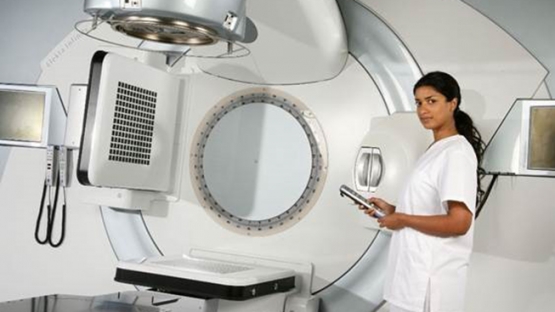The IAEA has helped secure the donation of an advanced radiotherapy machine by Elekta, an international oncology equipment manufacturer, for the Al-Bashir hospital in Amman, Jordan. The new machine, which will be delivered later this year, will provide life-saving cancer treatment to low-income Jordanians and an increasing number of refugees, most recently from Syria.
Hussam Al-Husseini, Jordan’s Ambassador to Austria and representative to the IAEA said, “Jordan is striving to provide the best possible cancer care to all patients in need. However, the increasing number of refugees in Jordan represents a tremendous strain for existing healthcare facilities and the already overstretched healthcare system. The donation of this new radiotherapy machine comes therefore at an important time and will boost our ability to treat and care for cancer patients for many years to come.”
In Jordan, cancer is the second largest leading cause of death after cardiovascular diseases. Due to an increase in life expectancy, prolonged exposure to risk factors and the influx of refugees, mostly from neighbouring Syria, the demand for quality and affordable cancer care has been rising. According to the International Agency for Cancer Research, there were over 6300 new cases of people with the disease in 2012 and over 3700 deaths. Even without taking into account the new refugee population, these figures were expected to more than double by 2030.
The Al-Bashir hospital is the only public hospital in Amman which provides cancer treatment, including radiotherapy, to low-income Jordanians and refugee populations, treating around 50 patients a day. The radiotherapy unit at the hospital lacks the human and infrastructural capacity to meet the increased demand, Al-Husseini said.
Once the new equipment is delivered, the radiotherapy facility will improve cancer diagnosis and treatment services, with the aim of treating at least 6000 patients a year.
The IAEA, through its Technical Cooperation programme, is contributing to this initiative and continues to support Jordan in its efforts to strengthen the safe and effective use of radiation, both with training of medical cancer care professionals and the procurement of critical equipment for cancer diagnostic and treatment over many years. The donation, which was facilitated by the IAEA’s Programme of Action for Cancer Therapy, comes at the back of recent IAEA support provided to the Al-Bashir hospital, including the installation and operation of a verification system for radiotherapy procedures to enhance their quality and safety.
Anja Nitzsche, Section Head for Resource Mobilization at the IAEA’s Programme of Action for Cancer Therapy (PACT), highlighted, “The collaboration between Jordan and Elekta in this project, coupled with the longstanding efforts of the IAEA’s Technical Cooperation programme, provides an excellent example of how various partners can come together to address a pressing health and development issue. Such public-private partnership arrangements can help make significant headway in the fight against cancer and systematically increase access to advanced nuclear science and technologies, including for populations most in need.”
Richard Hausmann, President & CEO of Elekta, emphasized the importance the company is attributing to this common effort. “Elekta has been working over the last decades on numerous radiation oncology projects in Jordan. In view of the increasing need for treatment of refugees and the overcharged healthcare system, we are pleased to support the country in relieving the burden on the national health system and providing quality cancer treatment services for refugees. This is part of Elekta’s corporate social responsibility.”






